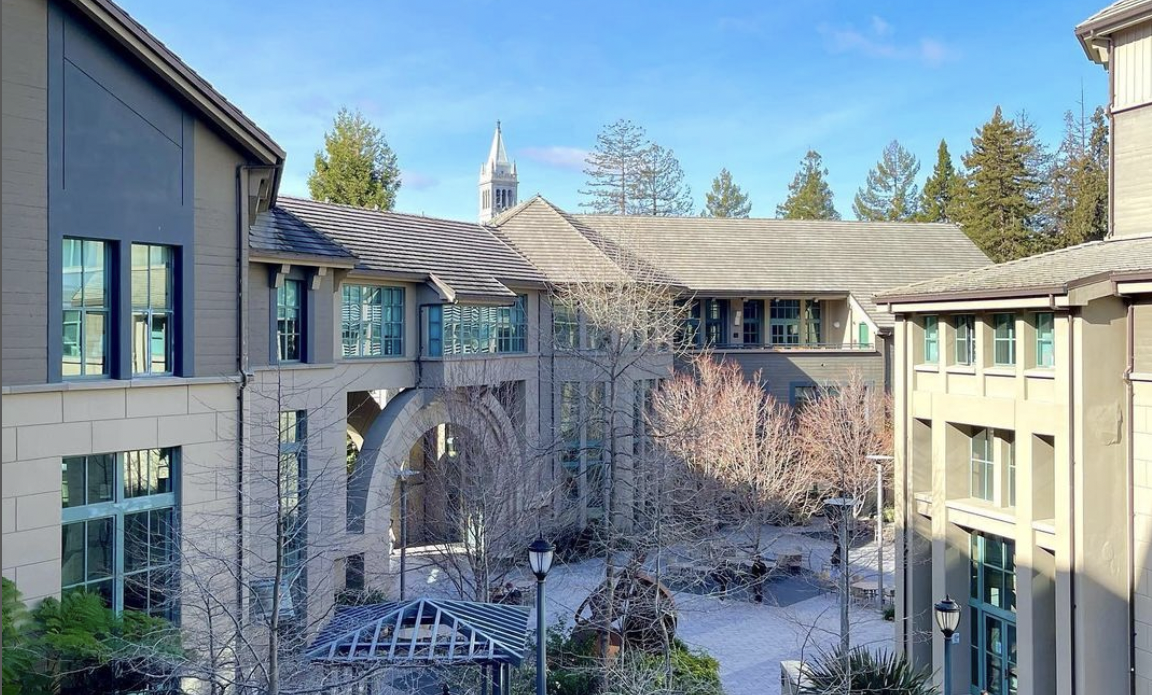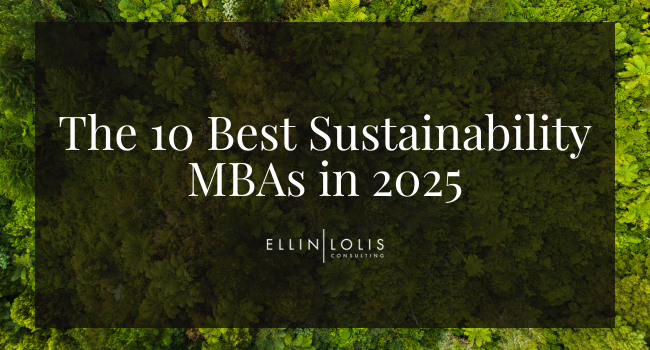UPDATE: This article was originally posted on April 5, 2021. It has been updated with new information and tips below.
As the urgency of dealing with climate change and unprecedented social and economic inequalities heightens, companies are increasingly expected to take responsibility to halt their contributions to these issues and contribute to solving them.
Nowadays, a huge part of a company’s reputation is based on its commitment to ESG. As such, this is becoming a major focus for MBA students.
With the potential to innovate like never before, now is a great opportunity for those in the business world to design and promote products, services, and models that contribute to, rather than hinder, social and environmental sustainability. An MBA in sustainability is likely to give candidates a competitive edge as markets evolve.
And that’s why more and more schools are offering MBAs in sustainability and social impact.
A sustainability MBA emphasizes environmental and social issues, as well as progress-oriented leadership and decision-making. The focus of different sustainability MBAs varies according to the school; for example, some schools focus on innovative entrepreneurship, while others focus on green technologies and production.
The benefits of an MBA with a sustainability focus
The shift towards sustainability is inevitable, and employers are increasingly looking for more global, responsible candidates. Furthermore, consumers are demanding that the companies they buy from make a shift to support, rather than damage, the societies, and environments they are a part of. Therefore, the benefits of focusing on sustainability for your MBA come from many directions.
It showcases your desire to lead positive change
With an MBA in sustainability, a potential employer will be able to see just from a quick glance at your resume that you are dedicated to understanding key market evolutions and pushing for positive change. It also shows that you have decided to take a position on the issues of climate change and social responsibility, which demonstrates courage and ethics.
Kathrin Winkler, former chief sustainability officer at EMC, has said that the most important quality a leader can have is “the willingness to listen to new, unexpected, or contrary ideas.”
The business world needs visionaries and changemakers, so developing a strong focus on sustainability is a great way to prove that you are passionate about taking on big challenges.
It will position you to take a leading role in ESG-focused industries
Climate change and other environmental issues will inevitably be key issues that all societies must face, and, hopefully, before more emergency situations arise. Therefore, a specialization in sustainability will allow you to step into newly-created leadership roles that incorporate ESG. As everything from finance to consumer goods to consulting is being dramatically reshaped by ESG concerns, having a specialization in this area will open up a world of opportunities for you.
What does a sustainability program look like?
While sustainability programs differ from school to school, as we will discuss more below, there are some common themes throughout the various schools that offer them.
MBAs with a focus on sustainability usually last two years. The first year is focused on a core curriculum similar to any MBA program’s fundamentals, including topics from management and communication to finance and entrepreneurship. The second year allows you to concentrate on sustainability issues within courses such as sustainable brand marketing, impact investing, and innovation strategy.
Some programs allow or even require you to do an internship or other experiential learning opportunities for which you will get practical experience at businesses and organizations working towards sustainability. Other programs may include a collaborative capstone project that tests the theory and skills you’ve learned over the course of the program.
What are the best sustainability programs?
While there are hundreds of sustainability programs out there, we’ve done our research to give you an idea of some of the best available programs along with what they offer. The following are not necessarily listed in ranked order.
MIT Sloan
 Unsplash
Unsplash
Location: Cambridge, MA, USA
Program length: 2 years
Why it’s so good: The sustainability certification offered by Sloan provides a mix of experiential and theoretical learning and includes many different sustainability-focused courses that students can choose from to tailor their experience.
Sloan also provides its students with sustainability-focused internships during the summer and the Sustainable Business Laboratory, where students work in teams on real business problems related to sustainability.
NYU Stern
 Source: @nyustern on Instagram
Source: @nyustern on Instagram
Location: New York, NY, USA
Program length: 2 years
Why it’s so good: Stern’s sustainability MBA focuses on current challenges and practices in business, giving students practical experience with existing and upcoming innovations in sustainability. Students can choose to be full- or part-time and there are opportunities to take courses with international partner schools, get involved in a Stern Signature Project or case competition, or get a research fellowship at Stern’s Center for Sustainable Business.
University of Michigan – Ross
 Source: @michiganross on Instagram
Source: @michiganross on Instagram
Location: Ann Arbor, MI, USA
Program length: 2 years
Why it’s so good: outside learning is emphasized in Ross’s many opportunities for sustainable learning, as students are required to take some courses outside of Ross, and 50% of total course selection are electives that allow students to choose the track that is best for them (from energy markets to urban agriculture).
You can also get involved in interdisciplinary collaboration – or a Dual Degree – at the Erb Institute for Sustainability in Business.
Berkeley Haas
 Source: @berkeleyhaas on Instagram
Source: @berkeleyhaas on Instagram
Location: Berkeley, CA, USA
Program length: 2 years
Why it’s so good: Berkeley, with its key value of “challenging the status quo” has numerous offerings for ESG-focused students. First, the school’s Center for Responsible Business offers a wide range of events and resources (think fellowships and scholarships) for MBAs focused on sustainability.
The Haas MBA also offers elective courses like “Social Finance”, which allow students to examine key business issues through an ESG lens.
Duke Fuqua
 Source: @dukefuqua on Instagram
Source: @dukefuqua on Instagram
Location: Durham, NC, USA
Program length: 2 years
Why it’s so good: Fuqua’s Client Consulting Practicum is a unique experiential learning opportunity that allows MBAs the chance to work on real issues for real companies and non-profits. For students focused on sustainability, it’s easy to focus your FCCP on this topic.
Fuqua also offers a specialization in Energy & Environment, perfectly suited to anyone looking to “gain specialized expertise in corporate sustainability, environmental management, energy science and policy, cleantech/energy entrepreneurship, carbon markets, environmental law, and other topics.”
Northwestern Kellogg
 Source: @kelloggschool on Instagram
Source: @kelloggschool on Instagram
Location: Evanston, IL, USA
Program length: 1 year OR 2 years
Why it’s so good: With a pathway (similar to a concentration) in Sustainability: Climate, Environment, & Energy, ESG-minded professionals have a lot to learn at Kellogg. In addition to courses like “Decision-Making for Sustainable Business” and “Circular Economy,” Kellogg offers experiential learning opportunities, like a Global Initiative in Management on the topic of sustainability.
Wharton
Source: @whartonschool on Instagram
Location: Philadelphia, PA, USA
Program length: 2 years
Why it’s so good: Wharton’s full-time MBA program offers a robust foundation for students passionate about sustainability through its Business, Energy, Environment, and Sustainability (BEES) major. This major is designed to delve into the intricate relationships between business and the natural environment, focusing on environmental risk management and the economics of energy. Additionally, Wharton’s Environmental, Social, and Governance (ESG) Initiative offers resources and support for students interested in the broader implications of sustainability in business. This initiative fosters research, curricular development, and co-curricular experiences that prepare students to lead in areas where business intersects with environmental and societal concerns.
Warwick Business School
 Source: @warwickbschool on Instagram
Source: @warwickbschool on Instagram
Location: Coventry, UK
Program length: 1 year
Why it’s so good: There is a reason this program is rated one of the top schools for sustainability. There are a wide range of relevant, interdisciplinary modules available such as the Economics of Wellbeing or other international modules focused on environmental issues and perspectives in countries around the world.
The Warwick MBA also features various modules in which the school has “integrated social and environmental sustainability across required modules, allowing you to address this complex, multidimensional subject from different angles depending on the discipline in which it is contextualised.” The program also gives students the opportunity to visit Vancouver, which is seen as the world’s greenest city, to learn about sustainability.
University of Exeter
 Source: @uniofexeter on Instagram
Source: @uniofexeter on Instagram
Location: Exeter, UK
Program length: 1 year (full-time) or 24-36 months (part-time executive MBA)
Why it’s so good: From the get-go, students at Exeter can already opt to take sustainability courses, which makes a big difference in such a short program. Courses include the mandatory “Designing a Better Future for All” and “Leading with Purpose.” Students also put what they learn into practice by participating in a community project to already begin to generate impact.
Stuart Robinson, program director of The Exeter MBA said: “The creation of sustainable practice is now in the mainstream of industrial, societal, and technological progress globally, so we are delighted to be recognised as an MBA that offers students the skills and knowledge to take this forward in their careers.”
Griffith Business School
 Source: @griffithbiz on Instagram
Source: @griffithbiz on Instagram
Location: Southport, Australia (Goldcoast Campus)
Program length: 1 – 1.5 years (full-time), 3 years (part-time, online only)
Why it’s so good: As the top school in the 2024 Corporate Knights Better World ranking for sustainability-focused MBA programs, Griffith Business School is a global powerhouse on the topic. Not only does the school’s curriculum align with the United Nations’ 17 Sustainable Development Goals, the core curriculum includes an impressive number of sustainability-focused courses, such as “Economics for a Sustainable Future” and “Leading for Sustainable People Outcomes.” You can’t go wrong at Griffith if sustainability is your focus and passion.
Get into a Top Sustainability MBA
As sustainability becomes a more common focus within MBA programs, it can be overwhelming to know which schools are the best fit for you and whether this is even the right choice for your future.
Luckily, Ellin Lolis Consulting has an outstanding team with the knowledge and advice you need to make these decisions. And what’s more, we can even help you get admitted to the program of your dreams with our expertise in successful MBA applications.
Whether you are considering a future in sustainability or need advice on how to appeal to the admissions committee at your program of choice, we here at Ellin Lolis Consulting are excited to help add more value to your application than you ever thought possible – all while retaining your unique voice.
98.9% of our clients get accepted to at least one of their preferred programs, and we’d love to help you, too! If you’re interested in working with us, apply to learn more about how we can support you during your MBA application journey.
Real MBA Essays That Got People In
School-specific sample essays that got our clients accepted








